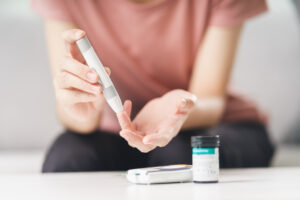3 Reasons Diabetes Slow Down Wound Healing Significantly

Diabetes is a disease where the body cannot either produce or use insulin to turn sugar into energy. This leads to problems like high blood sugar levels, which can affect your body’s many functions, including its ability to heal wounds. More often than not, those with diabetes tend to take much longer for their wounds to heal slowly. As such, if you have diabetes, make sure that any cuts, blisters, or any other wound are quickly tended after to avoid more drastic consequences.
That being said, if you’re wondering how exactly diabetes slows down the body’s ability to heal a wound, keep on reading:
1. Peripheral Neuropathy
Peripheral neuropathy is one of the consequences of high blood sugar levels, especially when those levels are consistently high. What happens is that, over time, the nerves and vessels found throughout the body slowly deteriorate and become damaged. This can cause certain parts of the body, commonly the feet and hands, to lose their sensitivity.
While this might not sound like it has to do anything with wound healing speed, it does have a role to play in detecting wounds in the first place. Areas like the food tend to get wounded, but since that area cannot be felt, the wounds go unnoticed. This is the reason many diabetic individuals tend to have a lot of food wounds simply because they don’t feel it in the first place.
2. Increased Blood Sugar Levels
Of course, high blood sugar level itself is also a problem. Regardless of where the wounds occur, high blood sugar does many things to hurt the body. First, it prevents nutrients and oxygen from reaching and energizing the cells in the body. Second, it hampers the body’s immune system, meaning that the immune system won’t be as effective as it would be to address wounds and tackle any foreign organisms. Third and finally, high blood sugar levels cause the body’s cells to become inflamed. Being too inflamed causes the body to slow down recovery, which further slows down wound healing.
3. Compromised Immune System
As mentioned earlier, one of the ways that diabetes slows down healing is because it compromises the immune system. More specifically, the immune system has a much tougher time trying to activate due to the high blood sugar levels. Even if it does activate, the number of fighter cells sent to heal wounds and tackle foreign attackers becomes greatly reduced. This causes the immune system to underperform, causing wounds to heal slower and increasing the risk of infection.
Conclusion
If you have diabetes and have just wounded yourself, take action immediately. Remember, your body’s compromised, and its wound-healing function isn’t as good as it used to be. Immediate action is vital to ensure the problem doesn’t reach the point that amputation is a must, so save your limbs and get the wound treated! That said, if you need a professional’s help, be sure to reach out to a medical center for assistance. They can help you address any wounds you might have, treating them effectively to ensure the body has enough time to heal the wound back up.
Morristown HC is a nursing home that acts as a bridge between hospital and home, offering high-caliber, patient-centered care and comprehensive clinical services to achieve excellent results. If you are looking for diabetic management help in Morristown, reach out to us today!